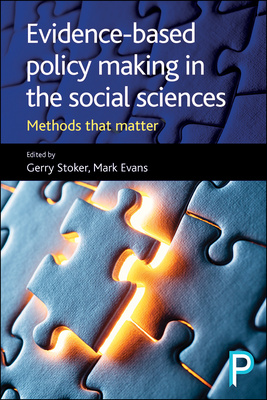In Evidence-Based Policy Making in the Social Sciences: Methods that Matter, editors Gerry Stoker and Mark Evans showcase tools through which to generate evidence-based policy insights. Released amidst discussions of a ‘post-truth’ era, this book is recommended to students looking to broaden their understanding of methods for providing meaningful evidence for policy creation, but leaves open the question of how social scientists can better improve their relationship with policymakers, finds Barton Edgerton.
Evidence-Based Policy Making in the Social Sciences: Methods that Matter. Gerry Stoker and Mark Evans (eds). Policy Press. 2016.
 The content of Western political discourse appeared to change in 2016, a shift that was significant enough to necessitate its own vocabulary. In the middle of November, the Oxford English Dictionary announced ‘post-truth’ – an adjective defined as ‘relating to or denoting circumstances in which objective facts are less influential in shaping public opinion than appeals to emotion and personal belief’ – as its word of the year.
The content of Western political discourse appeared to change in 2016, a shift that was significant enough to necessitate its own vocabulary. In the middle of November, the Oxford English Dictionary announced ‘post-truth’ – an adjective defined as ‘relating to or denoting circumstances in which objective facts are less influential in shaping public opinion than appeals to emotion and personal belief’ – as its word of the year.
Although the politics of the moment might eschew the truth, policy need not. Fortunately for citizens, a wide variety of organisations involved in making public policy rely on lessons developed from academic colleagues in the social sciences. However, the application of evidence to inform policy is often ad hoc and inconsistent. Gerry Stoker and Mark Evans seek to change this by showcasing a wide variety of methods and tools that can be applied by policymakers. In Evidence-Based Policy Making in the Social Sciences: Methods that Matter, they highlight resources that go beyond traditional tools such as econometrics and cost-benefit analysis.
The book aims to appeal to both students of public policy and practitioners – and it seems to arrive at a good time. If one purpose of public policy is to improve the lives of citizens, evidence-based methods give practitioners a chance to cut through the ideological fog that may limit the vision of policymakers and legislators in a post-truth environment. In the first two of thirteen chapters, the editors make the case for increasing evidence-based public policy. The remaining eleven each present a different social science method and make the case for its use by practitioners. Refreshingly, none of the chapters spends time trudging over the well-worn paths created by decades of traditional tools.
 Image Credit: (Nic McPhee CC BY SA 2.0)
Image Credit: (Nic McPhee CC BY SA 2.0)
In Part One, Stoker and Evans lay out the problem that this edited volume is intended to address. They accurately note that social scientists and policymakers are often at cross-purposes. The environment in which each operates can seem radically different, and each offers distinct incentives. Academic success is achieved through specialisation, where bespoke methods are developed in an attempt to identify solutions to increasingly narrow problems. Policymakers, on the other hand, must negotiate with a wide variety of stakeholders who may hold conflicting values. Simply put, their incentives do not align in a way that makes it easy for the lessons of social science to be incorporated into policymaking. Rather than lamenting the disconnect, or wish away the difficulties policymakers face, Stoker and Evans charge social scientists with changing what they can to make their own work easier to adopt.
The second section is the largest, with five chapters centred on tools that policymakers can use for ‘smarter learning’. While the chapters on randomised control trials and qualitative comparative analysis are clear and well-written, their content will likely be familiar to students of the field. However, several others stand out as novel and innovative approaches. Another chapter introduces visualisation, not as a way to communicate study results but rather to explore normally untouched, but abundant data – such as images and video – and engage with stakeholders in new ways.
More familiar-looking quantitative approaches are described in the third section. Chapters on big data, cluster analysis and micro-simulation modelling are easy for the reader to consume. The description of cluster analysis is likely to be especially informative to those new to the field. If the purpose of these chapters is to simply motivate students to learn more statistics, they might accomplish their task, but implementing them in policymaking likely requires a lot more on behalf of students. However, these techniques are unlikely to be novel at many of the institutions where policy is made. Organisations as diverse as the World Bank and national budget offices already make use of these techniques, often at exceptionally sophisticated levels. Of all the sections, the three techniques presented here will likely require a significant set of additional skills. They sit as a bit of an anti-Goldilocks: not detailed enough to teach new students how to do the techniques, but too general to improve the capabilities of a practitioner.
The final section attempts to break open the common structure of the social scientist – or policymaker – as an investigator who stands independent of individuals as subjects of inquiry. The three chapters in this section highlight methods that can bring citizens closer to research. The first chapter here makes the case for greater citizen involvement. This is followed by sections describing the potentially important role for including citizen deliberation in different elements of policymaking. The final chapter makes the case for involving both citizens and stakeholders in policy development.
Taken as a whole, the core methodology chapters will certainly help the public policy student broaden their understanding of the types of inquiries that can provide meaningful evidence in policy creation. Although few offer enough detail to enable a reader to make immediate use of these methodologies, they are likely to inspire at least some to learn more. Evidence-based policymaking is essential if policy is intended to measurably improve the lives of citizens. However, as the authors note, the different worlds in which social scientists and public policymakers live make this difficult. Stoker and Evans recognise this difficulty and speak to it in both the introductory chapters and the book’s conclusion. While the core chapters are interesting and motivating, they only briefly touch on what social scientists can do to improve relationships with practitioners. Of course, it is not their fault – it is hard enough to introduce student to new techniques. Yet, the book’s conclusion begs a second volume that is directed at academics rather than students, and the things social scientists can do to improve relationships with policymakers.
Barton Edgerton finished at the LSE in 2009 with a PhD in government. In an academic capacity, he has served as a visiting fellow in the government department at Harvard and as an adjunct in the political science department at Tufts. His research interests focus on the intersection of political theory, international relations and jurisprudence. For the past several years, he has worked in management consulting as an associate director and research consultant working with heads of HR, audit and risk management to help large, global organisations manage their largest strategic risks. Read more by Barton Edgerton.
Note: This review gives the views of the author, and not the position of the LSE Review of Books blog, or of the London School of Economics.








2 Comments